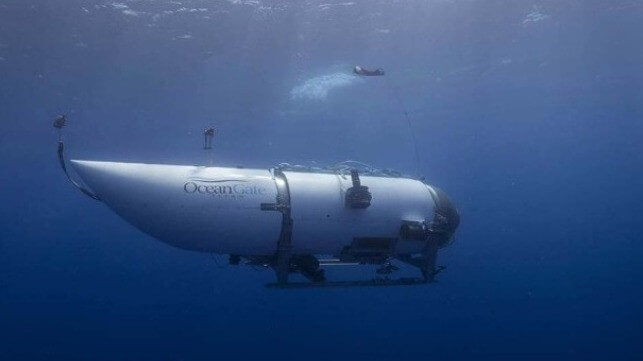Five Agencies Launch Inquiry Into Titanic Sub Casualty

All major North American marine safety agencies are investigating the catastrophic failure of the submersible Titan, which claimed the life of four paying passengers and the sub's owner as they attempted to visit the Titanic wreck site on June 18. The U.S. National Transportation Safety Board (NTSB), the U.S. Coast Guard, the Canadian Coast Guard, the Canadian Transportation Safety Board (TSB) and the Royal Canadian Mounted Police (RCMP) are all playing a role.
Though the operating company, owner and chartered vessel were all Canadian, the USCG is taking charge as the lead agency and will convene a Marine Board of Investigation, its highest level of investigative priority. The first order of business will be to recover evidence from the seabed at the wreck site, lead investigator Capt. Jason Neubauer told the media at a press conference Sunday.
On Saturday, the TSB and RCMP investigators diverted the chartered research vessel Polar Prince - the sub's launch platform - to a secure dock in St. Johns for boarding and inspection. About one dozen agents were seen going up the gangway on Saturday, according to the New York Times.
The process of conducting a forensic analysis will likely take at least one year, based on the pattern of past investigations, and will add to the tally of costs incurred. The Titan's last voyage has already cost the U.S. government at least one million dollars for search and rescue, according to independent estimates, and by federal law, the expense cannot be recouped from the operator - even though it chose to operate the recreational craft without classification and ignored repeated safety warnings.
SAR recipients' safety profile and their ability to pay are not factored into cost responsibility; this ensures that vessels in distress will not be deterred from calling for help for financial reasons. “The Coast Guard, as a matter of both law and policy, does not seek to recover the costs associated with search and rescue from the recipients of those services,” the Coast Guard said.
New evidence suggests that the SAR effort may have been a search and recovery mission from the outset. The U.S. Navy picked up acoustic signals consistent with a catastrophic implosion on the day the sub went missing, and it relayed this information to the U.S. Coast Guard immediately as the search began. The incident commander still made the decision to launch a five-day, multi-agency SAR operation in order to "make every effort to save the lives on board."
As late as Friday, subsea vessels with ROV assets were still on scene collecting evidence at the wreck site.
Inquiry into mass-fatality migrant wreck begins
On the other side of the Atlantic, EU border agency Frontex is launching a nonbinding inquiry into the migrant boat sinking that claimed the lives of up to 600 individuals in the Mediterranean on June 14. About 80 bodies have been recovered to date, and as many as 500 remain missing.
Frontex lacks the authority to conduct a full investigation and will confine its examination of the event to a "serious incident report," the organization told media.

that matters most
Get the latest maritime news delivered to your inbox daily.
A portion of the inquiry will focus on the Hellenic Coast Guard, which had assets on scene but declined to conduct a rescue in the hours leading up to the casualty. The agency maintains that the boat's occupants did not want to be saved. Some survivors have accused the Hellenic Coast Guard of attempting to conduct a tow before the vessel sank, a charge the agency denies.
There are no announced plans to examine the wreck site with an ROV.
